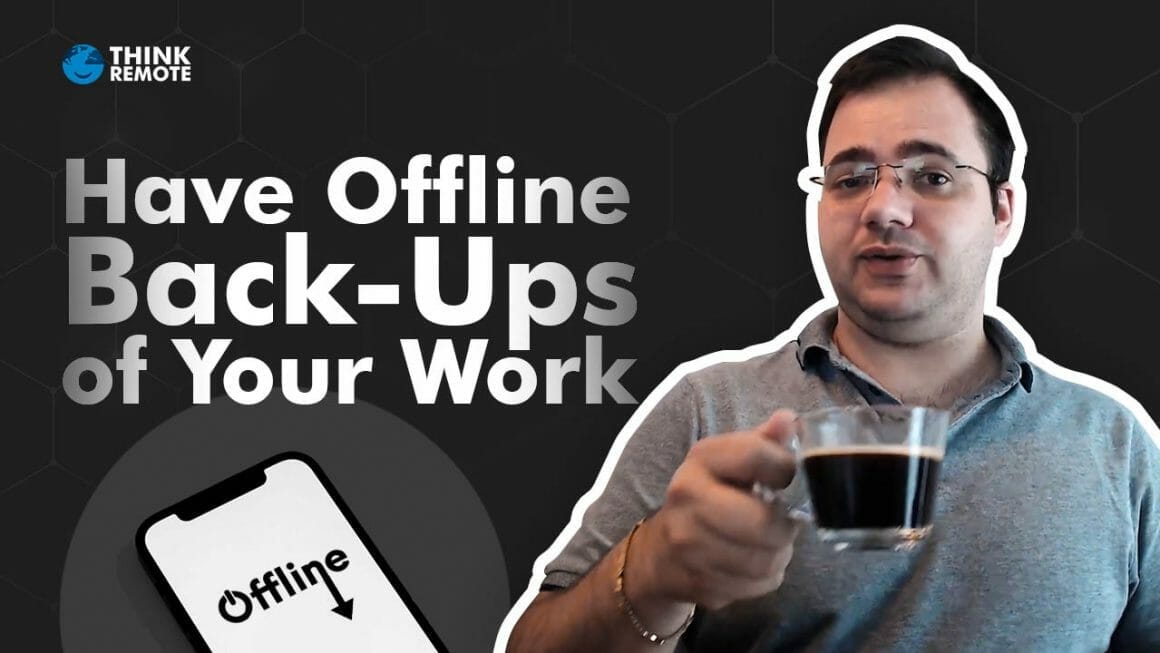How do you save all your work? Do you have online backups for everything you do? Let’s find out the best ways to save your work with Luis!
So, last week the internet broke. Maybe you weren’t affected, but millions of other people were desperate. How could they recover all their work files?
These things happen – luckily not usually – and you have to be prepared. The solution? Online back-ups!
Watch the video to know more!
Luis:
… have offline backups of your work, especially if you work remotely.
Welcome ladies and gentlemen to Virtual Coffee Chat with Luis. I am Louise, and this is my lovely double espresso. Very happy that you could be here today.
Let’s have a sip. Mm.
All right. So interesting week, last week, the internet broke somewhat for many people at any rate. Sometimes it happens, sometimes someone trips on the wire and unplugs the whole thing. Now, what happens if you’re relying on cloud service such as Google Cloud Drive or Microsoft Office… I think it’s 360, is it called, or is that the X-Box? I don’t know. Microsoft naming conventions are so confusing.
Anyway, at any rate, if you work remotely and you also happen to use exclusively online tools for your work, that’s going to leave you at the mercy of the health of the internet at large, and even of your local ISP. So you’ve heard probably, if you live in the internet, you’ve heard a lot of people talk about backups and the importance of backing up. Yes, and some little extra info for you today on today’s coffee.
If you work remotely, actually develop the habit of working offline to the extent that it’s possible, of course. I mean, for example, I have a remote team to manage. I can’t manage them offline. I can prepare to manage them offline, but I can’t really do the actual managing online, but a lot of the creative work I actually can. We got used to working online in online suits. If you’re designing stuff for social media, you work in Canva. If you’re a writer, you work in Google Docs, et cetera.
And I love and use all those tools, but I use them for delivery purposes and collaboration and feedback purposes. I don’t use them to do the bulk of the work. I have my own text. Let’s say writing tools in my computer, I make sure that they play well with the tools used by the team for collaboration. In this case, it’s Google Office, Google Docs. So I make sure they play nice so that I can do a one click copy past export to the Google Docs. But I do most of my work, 99% of my creative work, offline, so I’m not at the mercy of an internet connection.
If I need to, let’s say, come up with copy for five new landing pages this week, I will do that on my Notes app. And then maybe I’ll do it on pages on my Mac. And then only when it’s the time that I want to get some feedback and share it with other people, only then will I put it on Google Drive. Actually I put stuff in Google Drive even if it’s just for myself, because as I said at the beginning, always have backups, but always have local backups too.
So, your stuff isn’t safe, isn’t really, short-term safe in the cloud. It could be long-term save meaning it’s very unlikely that bulk data will be deleted on the cloud. At this point, we probably need a solar flare or a major cyber terrorist attack for that to happen. Could happen, but mostly you have… There’s the short-term possibility of you losing one or two days of work due to some sort of malfunction. Most of these companies, sadly, they don’t have an uptime policy, uptime contract. Now, when you work with enterprise software, the contract that you do and that you pay a lot of money for the service, they do commit to a 99.9% uptime, et cetera, et cetera. But chances are, if you’re working remotely today, you’re actually using tools even if you pay for them, I do have a paid subscription to Google Drive, but there’s no enforceable clause that say that Google owes me that 99.9% uptime. And even if there is, they can argue that 0.1% gives them a lot of leeway.
So do your work offline, your creative work, the content that you produce, if you’re in a position that you produce content, and everyone is producing content at some point unless you are in a exclusively managerial role, you’re probably going to be producing some kind of content, even if it’s content for internal consumption only, let’s say rules, developing systems, et cetera, do it all offline. Only upload it to the cloud when it’s either ready or in a QA stage. And, or actually what I just said, I can even improve on that, upload it to the cloud constantly, so you have a backup because you never know when the laptop is going to crash and burn. So you can then safely download stuff from the cloud.
So the important thing to get here is have your work always accessible offline, and have it always backed up in the cloud. I think this is what makes the most sense. Don’t think that just because it’s Google, or because it’s Microsoft, or et cetera, you’re going to have unmitigated access to your work because there might be situations where it’s out of their hands. I mean, let’s say that the internet crashes in your neighborhood, well, so much for that. So work offline, especially if you’re working remotely, work offline and then use cloud for backup, for sharing and for feedback.
That’s today’s Virtual Coffee Chat. If you thought that this was useful… I don’t know what’s happening with me today, I’m not being able to say my words. Too little coffee. I need more coffee.
So if you enjoyed the Virtual Coffee Chat, please know that there’s a lot of neat stuff in thinkremote.com, including all of the previous virtual coffee chats, but also lots of guides, how to use, and news about what’s up with remote work in the world of today. And of course, if you enjoyed this video, please like, subscribe, and share. Sharing is caring. See you tomorrow.






